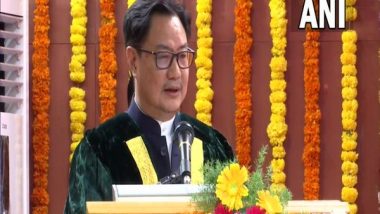New Delhi [India], December 2 (ANI): After Union Law and Justice Minister Kiren Rijiju on Friday stated that Indian Courts and the legal system must have regional languages in their curricular activities, experts from the legal fraternity gave their opinions on it.
Speaking about it, former Union Law Secretary PK Malhotra said that the statement of the Law Minister is a welcoming step and is in the right direction. It will help the litigants to understand the court proceedings and judgements of the courts in a better way.
PK Malhotra while talking to ANI said, "Our Constitution provides that English shall be the official language for the High Courts and the Supreme Court. However, states can permit use of regional language in the proceedings of the High Court. If a judgement is in the regional or any local language recognised by the Constitution, its English translation becomes essential if an appeal is to be filed in the Supreme Court."
However, Supreme Court Bar Association (SCBA) president Senior Advocate Vikas Singh said that English is the official language of the Supreme Court and it will not be possible to bring any other language in SC functioning.
Also Read | Nashik Horror: Missing 9-Year-Old Boy Found Dead Near Manmad-Daund Railway Tracks with Arm, Finger Severed.
Dr Adish C Aggarwala, Senior Advocate, Chairman of All India Bar Association has welcomed the statement of the Union Law Minister and suggested that it should be kept in mind that simultaneously we should also have the same translated in English language so that the lawyers and the judges coming from other parts of the country can also properly understand the case on the law and on facts as pleaded in the pleadings.
Advocate Sumit Gehlot, appearing in several constitutional matters said that the need of the hour is not that English be thrown out from the Supreme Court and the High Courts but their judgments be translated to the regional language which the litigants understands and the regional languages be used as an alternative for the proceedings of subordinate courts only and not for the High Courts and the Supreme Court, since, the litigants have fundamental right recognize as 'Right to Justice' under Article 21 of the Constitution to know the Court proceedings.
States of Rajasthan, Madhya Pradesh, Uttar Pradesh and Bihar are already using Hindi as an optional language. Though, as per Article 348(2) their judgments ought to be delivered in English language. The language of all courts subordinate to the High Courts generally remains the same as the language on the commencement of the Civil Procedure Code 1908, till the State Government otherwise directs. The state government has the power to declare any regional language as an alternative for the proceedings of the court, said Advocate Sumit Gehlot to ANI.
Advocate NS Nappinai, a Supreme Court lawyer belonging to Tamil Nadu stated that each one of us takes pride in our language and Tamil being one of the most ancient of languages has a special place in our hearts. Having said that the present situation ought to first be taken note of in its entirety and then changes evaluated keeping in mind the needs of the litigant.
If all proceedings in the High Court level were in vernacular it is the litigant who pays for translations to English for Supreme Court appeals. At that juncture, there is grave risk that a translation may not reflect the true or correct intent of the Court's pronouncement. Hence a reality check is warranted before any change to existing well-thought-out processes is considered, Advocate NS Nappinai suggested.
Union Law Minister Kiren Rijiju on Friday at the 12th Convocation of Tamil Nadu Dr Ambedkar Law University in Chennai said that Indian Courts and legal system must have regional languages in their curricular activities.
He said, "I have spoken to the Chief Justice, senior judges of Supreme Court, all Chief Justices of High Courts that in future we must give priority to local languages." (ANI)
(This is an unedited and auto-generated story from Syndicated News feed, LatestLY Staff may not have modified or edited the content body)













 Quickly
Quickly
















